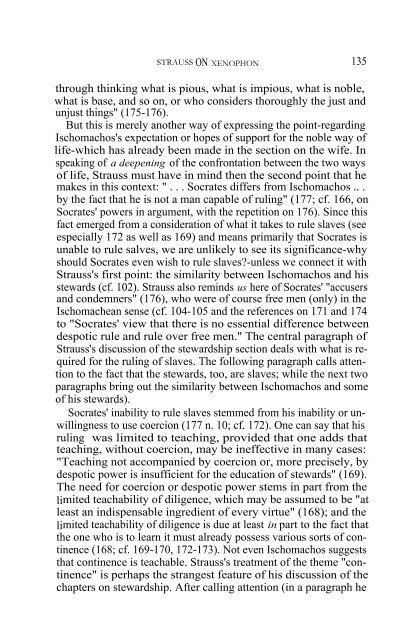Strauss on Xenophon's Socrates Xenophon's Socratic Discourse: An ...
Strauss on Xenophon's Socrates Xenophon's Socratic Discourse: An ...
Strauss on Xenophon's Socrates Xenophon's Socratic Discourse: An ...
You also want an ePaper? Increase the reach of your titles
YUMPU automatically turns print PDFs into web optimized ePapers that Google loves.
STRAUSS ON XENOPHON<br />
through thinking what is pious, what is impious, what is noble,<br />
what is base, and so <strong>on</strong>, or who c<strong>on</strong>siders thoroughly the just and<br />
unjust things" (175-176).<br />
But this is merely another way of expressing the point-regarding<br />
Ischomachos's expectati<strong>on</strong> or hopes of support for the noble way of<br />
life-which has already been made in the secti<strong>on</strong> <strong>on</strong> the wife. In<br />
speaking of a deepening of the c<strong>on</strong>fr<strong>on</strong>tati<strong>on</strong> between the two ways<br />
of life, <str<strong>on</strong>g>Strauss</str<strong>on</strong>g> must have in mind then the sec<strong>on</strong>d point that he<br />
makes in this c<strong>on</strong>text: " . . . <strong>Socrates</strong> differs from Ischomachos .. .<br />
by the fact that he is not a man capable of ruling" (177; cf. 166, <strong>on</strong><br />
<strong>Socrates</strong>' powers in argument, with the repetiti<strong>on</strong> <strong>on</strong> 176). Since this<br />
fact emerged from a c<strong>on</strong>siderati<strong>on</strong> of what it takes to rule slaves (see<br />
especially 172 as well as 169) and means primarily that <strong>Socrates</strong> is<br />
unable to rule salves, we are unlikely to see its significance-why<br />
should <strong>Socrates</strong> even wish to rule slaves?-unless we c<strong>on</strong>nect it with<br />
<str<strong>on</strong>g>Strauss</str<strong>on</strong>g>'s first point: the similarity between Ischomachos and his<br />
stewards (cf. 102). <str<strong>on</strong>g>Strauss</str<strong>on</strong>g> also reminds us here of <strong>Socrates</strong>' "accusers<br />
and c<strong>on</strong>demners" (176), who were of course free men (<strong>on</strong>ly) in the<br />
Ischomachean sense (cf. 104-105 and the references <strong>on</strong> 171 and 174<br />
to "<strong>Socrates</strong>' view that there is no essential difference between<br />
despotic rule and rule over free men." The central paragraph of<br />
<str<strong>on</strong>g>Strauss</str<strong>on</strong>g>'s discussi<strong>on</strong> of the stewardship secti<strong>on</strong> deals with what is required<br />
for the ruling of slaves. The following paragraph calls attenti<strong>on</strong><br />
to the fact that the stewards, too, are slaves; while the next two<br />
paragraphs bring out the similarity between Ischomachos and some<br />
of his stewards).<br />
<strong>Socrates</strong>' inability to rule slaves stemmed from his inability or unwillingness<br />
to use coerci<strong>on</strong> (177 n. 10; cf. 172). One can say that his<br />
ruling was limited to teaching, provided that <strong>on</strong>e adds that<br />
teaching, without coerci<strong>on</strong>, may be ineffective in many cases:<br />
"Teaching not accompanied by coerci<strong>on</strong> or, more precisely, by<br />
despotic power is insufficient for the educati<strong>on</strong> of stewards" (169).<br />
The need for coerci<strong>on</strong> or despotic power stems in part from the<br />
limited teachability of diligence, which may be assumed to be "at<br />
least an indispensable ingredient of every virtue" (168); and the<br />
limited teachability of diligence is due at least in part to the fact that<br />
the <strong>on</strong>e who is to learn it must already possess various sorts of c<strong>on</strong>tinence<br />
(168; cf. 169-170, 172-173). Not even Ischomachos suggests<br />
that c<strong>on</strong>tinence is teachable. <str<strong>on</strong>g>Strauss</str<strong>on</strong>g>'s treatment of the theme "c<strong>on</strong>tinence"<br />
is perhaps the strangest feature of his discussi<strong>on</strong> of the<br />
chapters <strong>on</strong> stewardship. After calling attenti<strong>on</strong> (in a paragraph he<br />
135

















